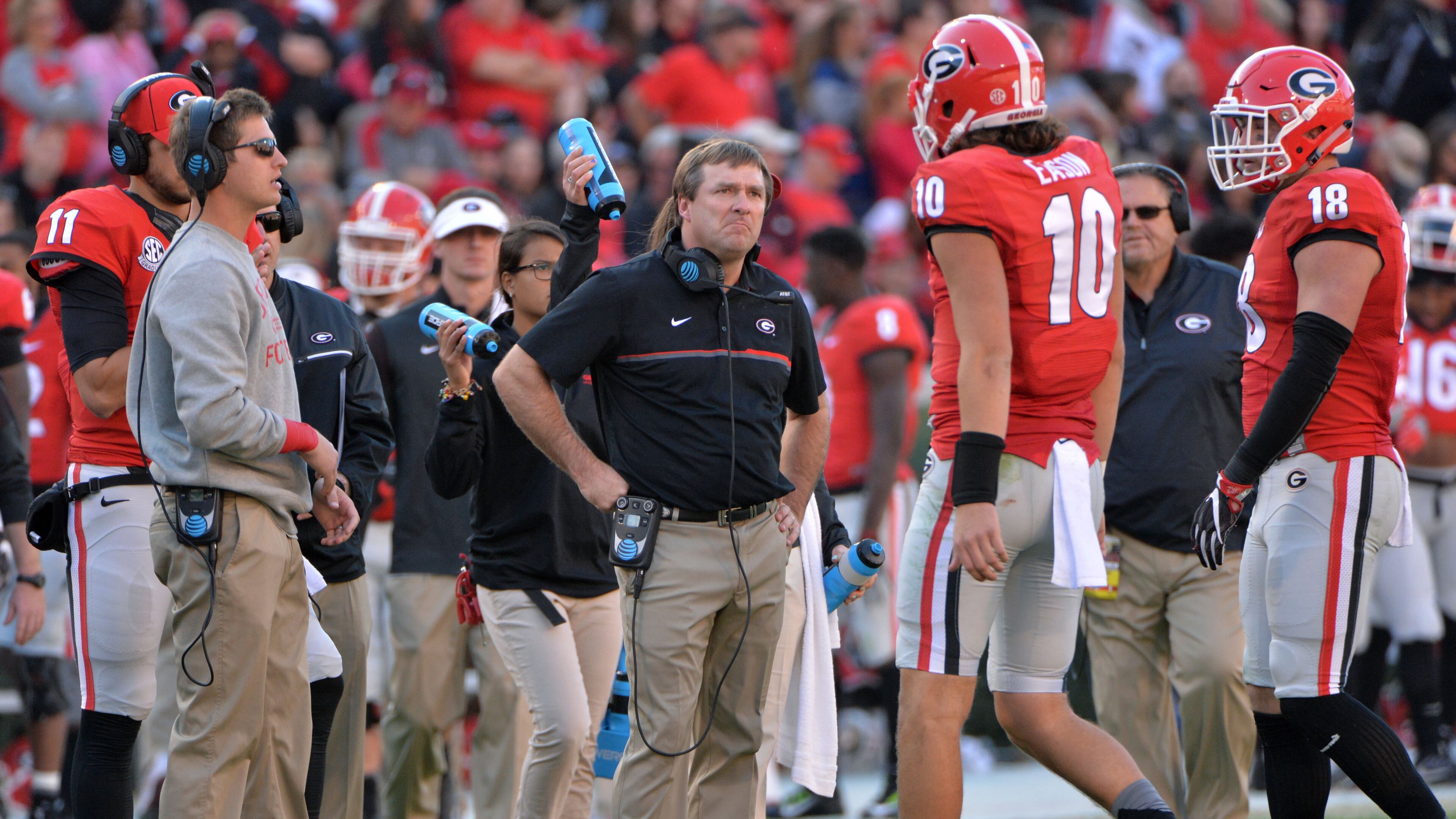Kirby Smart hopes to end this season’s learning curve with win

Nothing against the city of Memphis, barbecue or certainly the memory of Elvis and all of his blue suedeness. But this wasn’t part of the plan.
No TripTik in Georgia football hell was supposed to route the Bulldogs through the potholes that punctuated this 7-5 season, no goal or expectation set after the hiring of a shiny new coach from Alabama figured on a concluding game in the Liberty Bowl.
Because while bowl games are supposed to be rewards, the Liberty Bowl is the equivalent of the green Jello on the dessert bar.
This was a lost season before November. Georgia was 2-4 in the SEC when it dragged its pummeled bodies out of Jacksonville. But that doesn't render Friday's game against TCU completely devoid of meaning for the program. The Bulldogs need to win because an 8-5 finish looks far better aesthetically than 7-6.
They also need to win because games like this, even if they lack a significant impact in rankings or athletic donor love, represent somewhat of an unofficial start of next season and it will be interesting to see just how motivated players are.
“You (players) can get lost in these games,” Kirby Smart said Thursday. “Like, ‘Why am I here? What are we doing here.’”
So Smart and his staff have tried to hammer home the importance of finishing the season strong. I’m guessing Mark Richt and his staff tried the same thing in 2010. That was the last time Georgia was sent to this game — and it played like it was a death-row sentence. The Aaron Murray/A.J. Green-led offense produced two field goals. The Dogs lost to Central Florida 10-6. After the game, Richt didn’t immediately accept the runner-up trophy, telling a bowl official the team would get it later (though it remains uncertain if that minor piece of hardware ever made it onto the team flight back).
This season has been about growing pains, as much for Smart as for freshman quarterback Jacob Eason and other young players on the roster.
There was a level of dysfunction with the offense. Plans appeared to change midstream — from the week of practice to the game, from quarter to quarter and series to series. It crescendoed in the days following the 24-10 loss to Florida, when Georgia ran the ball only 19 times for 21 yards, prompting Nick Chubb and Sony Michel to vent their frustrations to offensive coordinator Jim Chaney.
It’s not known how much philosophy or in-game play-calling was being dictated by Smart. Chaney did the proper thing by throwing himself on the grenade this week, saying, “The bottom line is it didn’t get done. It ends with me to get done.” But there’s no question the Dogs were more committed to the run down the stretch. Chubb and Michel then gave Smart the biggest gift of all when they announced they would return for their senior season.
On defense, Georgia improved down the stretch, at least until the final game, when Georgia Tech drove for two touchdowns in the final six and a half minutes for an upset win in Athens. Georgia had three current or former defensive coordinators providing input that week: Smart, defensive coordinator Mel Tucker and former DC Brian VanGorder. It didn't make a difference.
Smart was so determined to amend for that performance against Tech’s triple option that in the days following the loss, he reached out to a third party to see if former long-time Navy defensive coordinator Buddy Green would be willing to come aboard as a consultant.
The answer from Green: no.
Smart confirmed Thursday he reached out indirectly to Green because he knew the assistant coach, despite his friendship and past ties to Tech coach Paul Johnson, had helped Clemson prepare before its game against Tech. Smart was hoping Green would do the same for Georgia. But it turned out Green helped Clemson only because his son works there (director of video).
Smart said he has since acquired the assistance of others, without divulging who. But the anecdote illustrates how determined Smart is to get Georgia turned around next season.
Smart agreed that the final game is as much about a look to next season as finishing this one. The focus in the first three practices was on next year’s returning players, not seniors.
“I talked to several coaches in my coaching circle who said they didn’t even practice their seniors the first three practices,” he said.
Smart was associated with nothing but success as an assistant at Alabama, so this season has been a little bit of a cold slap.
“It’s hard to quantify,” he said when asked about the learning process in his first year as a head coach. “It’s really hard to simulate all these firsts — first game, first loss, first win, first experience of (playing) on Sunday. But I certainly feel more comfortable having been through a season.”
He also said he feels more in sync with his staff now. Smart and/or Chaney might’ve been determined to have a certain offensive philosophy this season but it became clear — belatedly — that Eason wasn’t where he needed to be yet.
In the end, it will be about wins and losses. But Smart is focused on the process of getting there.
“If you just focus on results, you won’t get what you want out of life, you won’t get what you want out of a season, you won’t get what you want out of a game,” he said.
More Stories
The Latest


